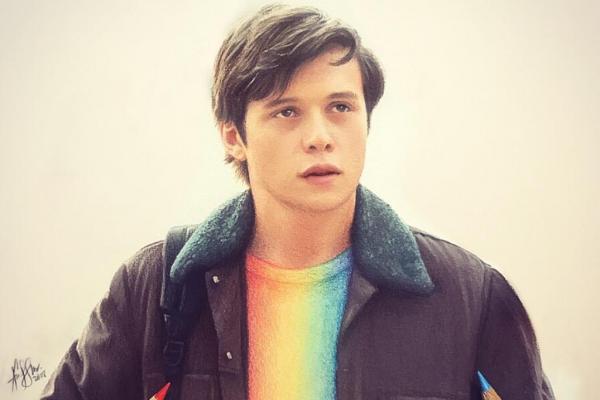“I deserve a great love story,” gay teenager Simon Spier (Nick Robinson) says in one scene in Love, Simon. And in many ways, the whole movie — an adaptation of Becky Albertalli’s award-winning novel Simon vs. The Homo Sapiens Agenda — feels like a response to that line.
This is a film that believes everyone deserves a sweet, sappy movie love story, especially people who are often denied them. It also believes in the imago dei of its characters, from its leading man to its supporting cast, using the frameworks and archetypes of romantic comedy influences to flesh out, rather than flatten, its characters.
Robinson’s Simon enjoys a pretty nice high school experience. He’s got a tight-knit group of friends and supportive family. He’s a smart, sensitive kid who spends time with the drama nerds as well as the jocks, and seems to fit in just about anywhere. But Simon is closeted, and worries that if he comes out, his otherwise-secure life will be upended. So when a fellow student outs himself in an anonymous blog post, Simon starts up a correspondence, finally allowing himself to say to a stranger the things he’s been feeling for years. But when their messages fall into the wrong hands, Simon risks the rest of the world finding out his secret before he’s ready to share it.
Romantic comedies exist in a universe that is usually a bit brighter and happier than the real world, and Love, Simon is no exception. Simon’s house is bigger and nicer than yours or mine. He and his friends are wittier and better dressed than most high schoolers. But unlike the mostly-white, suburban enclaves of movies like Sixteen Candles, the students and teachers of Love, Simon feel a little closer to the real thing.
The cast is diverse, and the film dares to give its supporting characters more depth, hinting that they have their own lives going on away from the main action. Some of Simon’s friends come from single-parent homes, or multi-ethnic families, which the movie doesn’t go out of its way to highlight but simply shows as a matter of fact. Teachers make a real effort to support their students and mostly seem to like their job. Even the story’s antagonist has more going on than simply being a jerk, getting a fully-realized character arc.
Robinson’s performance as Simon is worth noting in the way it adheres to and subverts teen movie characters we’ve seen before, with particular regard to the master of the genre, John Hughes. Robinson’s got all the charm, looks, and outward swagger of a Hughes leading man, with the inner confusion and insecurity of Molly Ringwald, all rolled into one. He’s the rare effortlessly cool movie teen who doesn’t have it all figured out. And his friends are honest about their own issues, too, providing a refreshing portrait of movie teenagers that hits closer to reality.
There are times when Love, Simon feels like a progressive dream, where people are a little more enlightened, and even major conflicts can be neatly resolved in a couple of hours. It’s hard to watch without thinking of the many LGBTQ teenagers who wish their coming out stories were this clean, or their families this supportive. But in a way, that’s part of the point. Love, Simon, like the movies that inspired it, is a teen movie and a rom-com meant to give kids like its main character the kind of movie they’ve seen before, but haven’t seen themselves in. It’s a bright, shiny love story that embraces a more diverse identity, and reminds us that there’s more to others’ stories than what we see on the surface.
Got something to say about what you're reading? We value your feedback!







